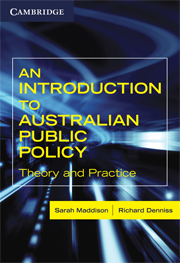Book contents
- Frontmatter
- Contents
- List of figures
- List of tables
- List of case studies exercises, and original contributions
- Foreword
- PART 1 Policy and theory
- PART 2 Policy in practice
- 7 Who does policy?
- 8 The nuts and bolts of policy work: advice, implementation and evaluation
- 9 The role of the media in setting the policy agenda
- 10 Consulting with stakeholders
- 11 Research and policy
- 12 Communication, ethics and accountability
- References
- Index
- References
11 - Research and policy
- Frontmatter
- Contents
- List of figures
- List of tables
- List of case studies exercises, and original contributions
- Foreword
- PART 1 Policy and theory
- PART 2 Policy in practice
- 7 Who does policy?
- 8 The nuts and bolts of policy work: advice, implementation and evaluation
- 9 The role of the media in setting the policy agenda
- 10 Consulting with stakeholders
- 11 Research and policy
- 12 Communication, ethics and accountability
- References
- Index
- References
Summary
More often than not, the issues that policy workers deal with on a daily basis are highly complex. While much in the theoretical literature (such as the idea of rational decision making discussed in Chapter 1 or theories concerning policy analysis and policy instruments as discussed in Chapter 4) suggests that clarity and certainty should characterise the policy development process, in reality determining the ‘right’ policy response from the vast array of available choices, with access to imperfect information and disparate community views, can be a daunting task.
In recent years the demand has been for ‘evidence-based policy’, which raises questions about what kinds of evidence exist and how it is best uncovered for the purposes of informing public policy. One possible implication of the term ‘evidence-based policy’ is that the contested and uncertain policy process discussed throughout this book can be rendered objective and certain. However, as will be discussed below, while there is no doubt that the collection and analysis of information has the potential to improve the advice provided to policy makers, there is no obligation on policy makers to heed such advice.
This chapter begins with a discussion of the different research methods that policy researchers rely upon most heavily and the different weights that are often attached to research conducted by different groups. The concept of ‘evidence-based policy’ is then discussed. The chapter concludes with an overview of the characteristics of good research, and in turn, the characteristics of a good policy researcher.
- Type
- Chapter
- Information
- An Introduction to Australian Public PolicyTheory and Practice, pp. 217 - 233Publisher: Cambridge University PressPrint publication year: 2009



